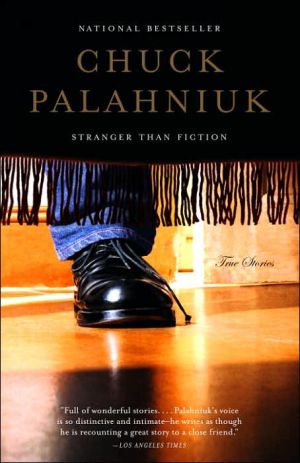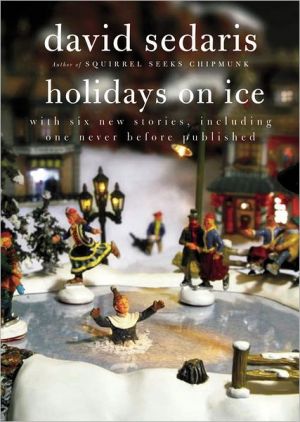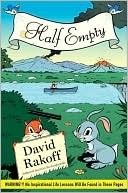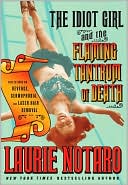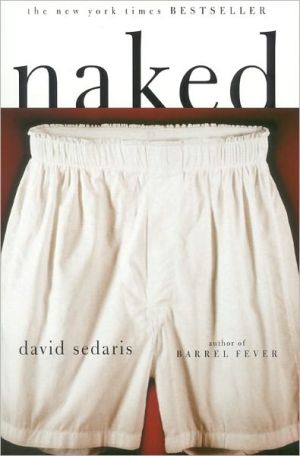Stranger Than Fiction: True Stories
Chuck Palahniuk’s world has always been, well, different from yours and mine. In his first collection of nonfiction, Chuck Palahniuk brings us into this world, and gives us a glimpse of what inspires his fiction.At the Rock Creek Lodge Testicle Festival in Missoula, Montana, average people perform public sex acts on an outdoor stage. In a mansion once occupied by The Rolling Stones, Marilyn Manson reads his own Tarot cards and talks sweetly to his beautiful actress girlfriend. Across the...
Search in google:
Chuck Palahniuk’s world has always been, well, different from yours and mine. In his first collection of nonfiction, Chuck Palahniuk brings us into this world, and gives us a glimpse of what inspires his fiction.At the Rock Creek Lodge Testicle Festival in Missoula, Montana, average people perform public sex acts on an outdoor stage. In a mansion once occupied by The Rolling Stones, Marilyn Manson reads his own Tarot cards and talks sweetly to his beautiful actress girlfriend. Across the country, men build their own full-size castles and rocketships that will send them into space. Palahniuk himself experiments with steroids, works on an assembly line by day and as a hospice volunteer by night, and experiences the brutal murder of his father by a white supremacist. With this new direction, Chuck Palahniuk has proven he can do anything.The New York Times - Janet MaslinThis collection is as interesting for its insights into how that fiction takes shape, and for autobiographical glimmers, as it is for its ostensible talking points about submarines, rescue dogs or profile subjects like the writers Andrew Sullivan and Amy Hempel. Throughout the book he can be found formulating the kinds of neat, tricky locutions and singsong repetitions that turn up in his fiction.
You Are Here\ In the ballroom at the Airport Sheraton Hotel, a team of men and women sit inside separate booths, curtained off from each other. They each sit at a small table, the curtains enclosing a space just big enough for the table and two chairs. And they listen. All day, they sit and listen.\ Outside the ballroom, a crowd waits in the lobby, writers holding book manuscripts or movie screenplays. An organizer guards the ballroom doors, checking a list of names on a clipboard. She calls your name, and you step forward and follow her into the ballroom. The organizer parts a curtain. You take a seat at the little table. And you start to talk.\ As a writer, you have seven minutes. Some places you might get eight or even ten minutes, but then the organizer will return to replace you with another writer. For this window of time, you’ve paid between twenty and fifty dollars to pitch your story to a book agent or a publisher or movie producer.\ And all day, the ballroom at the Airport Sheraton is buzzing with talk. Most of the writers here are old—creepy old, retired people clutching their one good story. Shaking their manuscript in both spotted hands and saying, “Here! Read my incest story!”\ A big segment of the storytelling is about personal suffering. There’s the stink of catharsis. Of melodrama and memoir. A writer friend refers to this school as “the-sun-is-shining-the-birds-are-singing-and-my-father-is-on-top-of-me-again” literature.\ In the lobby outside the hotel ballroom, writers wait, practicing their one big story on each other. A wartime submarine battle, or being knocked around by a drunk spouse. The story about how they suffered, but survived to win. Challenge and triumph. They time each other with wristwatches. In just minutes, they’ll have to tell their story, and prove how it would be perfect for Julia Roberts. Or Harrison Ford. Or, if not Harrison, then Mel Gibson. And if not Julia, then Meryl.\ Then, sorry, your seven minutes is up.\ The conference organizer always interrupts at the best part of the pitch, where you’re deep into telling about your drug addiction. Your gang rape. Your drunken dive into a shallow pool on the Yakima River. And how it would make a great feature film. And, if not that, then a great cable film. Or a great made-for-television movie.\ Then, sorry, your seven minutes is up.\ The crowd out in the lobby, each writer holding his story in his hand, it’s a little like the crowd here last week for the Antiques Road Show. Each person carrying some burden: a gilded clock or a scar from a house fire or the story of being a married, gay Mormon. This is something they’ve lugged around their whole life, and now they’re here to see what it will fetch on the open market. Just what is this worth? This china teapot, or crippling spinal disease. Is it a treasure or just more junk.\ Then, sorry, your seven minutes is up.\ In the hotel ballroom, in those curtained cubicles, one person sits passive while the other exhausts himself. In that way, it’s like a brothel. The passive listener paid to receive. The active speaker paying to be heard. To leave behind some trace of himself—always hoping this trace is enough to take root and grow into something bigger. A book. A baby. An heir to his story, to carry his name into the future. But the listener, he’s heard it all. He’s polite, but bored. Hard to impress. This is your seven minutes in the saddle—so to speak—but your whore is looking at his own wristwatch, wondering what’s for lunch, planning on how to spend the stipend money. Then . . .\ Sorry, your seven minutes is up.\ Here’s your life story, but reduced to two hours. What was your birth, your mother going into labor in the backseat of a taxi—that’s now your opening sequence. Losing your virginity is the climax of your first act. Addiction to painkillers is your second-act build. The results of your biopsy is your third-act reveal. Lauren Bacall would be perfect as your grandmother. William H. Macy as your father. Directed by Peter Jackson or Roman Polanski.\ This is your life, but processed. Hammered into the mold of a good screenplay. Interpreted according to the model of a successful box-office hit. It’s no surprise you’ve started seeing every day in terms of another plot point. Music becomes your soundtrack. Clothing becomes costume. Conversation, dialogue. Our technology for telling stories becomes our language for remembering our lives. For understanding ourselves. Our framework for perceiving the world.\ We see our lives in terms of storytelling conventions. Our serial marriages become sequels. Our childhood: our prequel. Our children: spin-offs.\ Just consider how fast everyday people started using phrases like “fade to black.” Or “wipe dissolve.” Or fast-forward. Jump cut to . . . Flash back to . . . Dream sequence . . . Roll credits . . .\ Then, sorry, your seven minutes is up.\ It’s twenty, thirty, fifty dollars for another seven minutes. For another shot at connecting with the bigger world. For selling your story. To turn that misery into big money. Book-advance money, or movie-option money. That big mega-jackpot.\ A few years ago, only a few of these conventions shipped industry players from New York and Los Angeles, put them up in hotels, and paid them a stipend to sit here and listen. Now there are so many conventions that organizers must scrape the barrel a little, looking for any producer’s assistant or associate editor who can spare a weekend to fly out to Kansas City or Bellingham or Nashville.\ This is the Midwest Writers Conference. Or the Writers of Southern California Conference. Or the Georgia State Writers Conference. As a hopeful writer, you’ve paid to get in the door, for a name badge and a keynote lunch. There are classes to attend, lectures about technique and marketing. There’s the mixed comfort and competition of other writers. Fellow writers. So many of them with a manuscript under one arm. You pay the extra money, the seven-minute money, to buy the ear of an industry player. To buy the chance to sell, and maybe you’ll walk away with some money and recognition for your story. An experiential lottery ticket. A chance to turn lemons—a miscarriage, a drunk driver, a grizzly bear—into lemonade.\ Straw, but spun into gold. Here in the big storytelling casino.\ Then, sorry, your seven minutes is up.\ In another way, this hotel ballroom, it’s filled with people telling about their one awful crime. Spilling their guts about how they aborted a child. How they smuggled drugs stuffed up their ass all the way from Pakistan. Here’s how they fell out of grace, the opposite of a hero’s story. Here’s how they can sell even their bad example—how it can help others. Prevent similar disasters. These people are here to find redemption. To them, each curtained booth becomes a confessional. Each movie producer, a priest.\ It’s no longer God waiting in judgment. It’s the marketplace.\ Maybe a book contract is the new halo. Our new reward for surviving with strength and character. Instead of heaven, we get money and media attention.\ Maybe a movie starring Julia Roberts, bigger than life and pretty as an angel, is the only afterlife we get.\ And that’s only if . . . your life, your story is something you can package and market and sell.\ In another way, this is so much like the crowd here last month, when a television game show was auditioning contestants. To answer brain teasers. Or the month before, when producers for a daytime talk show were here, looking for troubled people who wanted to air their problems on national television . . . fathers and sons who’ve shared the same sex partner. Or mothers suing for child support. Or anyone getting a sex change.\ Then, sorry, your seven minutes is up.\ The philosopher Martin Heidegger pointed out how human beings tend to look at the world as a standing stock of material, ready for us to use. As inventory to be processed into something more valuable. Trees into wood. Animals into meat. He called this world of raw natural resources: bestand. It seems inevitable that people without access to natural bestand such as oil wells or diamond mines, that they’d turn to the only inventory they do have—their lives.\ More and more, the bestand of our era is our own intellectual property. Our ideas. Our life stories. Our experience.\ What people used to endure or enjoy—all those plot-point events of potty training and honeymoons and lung cancer—now they can be shaped to best effect and sold.\ The trick is to pay attention. Take notes.\ The problem with seeing the world as bestand, Heidegger said, was it leads you to use things, enslave and exploit things and people, for your own benefit.\ With this in mind, is it possible to enslave yourself?\ Martin Heidegger also points out that an event is shaped by the presence of the observer. A tree falling in the forest is somehow different if someone is there, noting and accenting the details in order to turn it into a Julia Roberts vehicle.\ If only by distorting events, tweaking them for more dramatic impact, exaggerating them to the point you forget your actual history—you forget who you are—is it possible to exploit your own life for the sake of a marketable story?\ But then, sorry, but your seven minutes is up.\ Maybe we should’ve seen this coming.\ In the 1960s and ’70s, televised cooking shows coaxed a rising class of people to spend their extra time and money on food and wine. From eating, they moved on to cooking. Led by how-to experts like Julia Child and Graham Kerr, we exploded the market for Viking ranges and copper cookware. In the 1980s, with the freedom of VCRs and CD players, entertainment moved in to become our new obsession.\ Movies became the field where people could meet and debate, like they did over soufflés and wine a decade before. Like Julia Child had, Gene Siskel and Roger Ebert appeared on television and taught us how to split hairs. Entertainment became the next place to invest our extra time and money.\ Instead of the vintage and bouquet and legs of a wine, we talked about the effective use of voice-over and back story and character development.\ In the 1990s, we turned to books. And instead of Roger Ebert it was Oprah Winfrey.\ Still, the really big difference was, you could cook at home. You really couldn’t make a movie, not at home. But, you could write a book. Or a screenplay. And those do become movies.\ The screenwriter Andrew Kevin Walker once said that no one in Los Angeles is ever more than fifty feet from a screenplay. They’re stowed in the trunks of cars. In desk drawers at work. In laptop computers. Always ready to be pitched. A winning lottery ticket looking for its jackpot. An uncashed paycheck.\ For the first time in history, five factors have aligned to bring about this explosion in storytelling. In no particular order the factors are:\ Free time.\ Technology.\ Material.\ Education.\ And disgust.\ The first seems simple. More people have more free time. People are retiring and living longer. Our standard of living and social safety net allows people to work fewer hours. Plus, as more people recognize the value of storytelling—but strictly as book and movie material—more people see writing, reading, and research as something more than just a highbrow recreation. Writing’s not just a nice little hobby. It’s becoming a bona fide financial endeavor worth your time and energy. Telling anyone that you write always prompts the question “What have you published?” Our expectation is: writing equals money. Or good writing should. Still, it would be damn near impossible to get your work seen if not for the second factor:\ Technology. For a small investment, you can be published on the Internet, accessible to millions of people worldwide. Printers and small presses can provide any number of on-demand hard-copy books for anybody with the money to self-publish. Or subsidy publish. Or vanity publish. Or whatever you want to call it. Anybody who can use a photocopy machine and a stapler can publish a book. It’s never been so easy. Never in history have so many books hit the market each year. All of them filled with the third factor:\ Material. As more people grow old, with the experience of a lifetime to remember, the more they worry about losing it. All those memories. Their best formulas, stories, routines for making a dinner table burst into laughter. Their legacy. Their life. Just a touch of Alzheimer’s disease, and it could all disappear. Besides, all our best adventures seem to be behind us. So it feels good to relive them, to share them on paper. Organizing and making all that flotsam and jetsam make sense. Wrapping it up, neat and tidy, and putting a nice bow on top. The first volume in the three-volume boxed set that will be your life. The “best of” NFL highlights tape of your life. All in one place, your reasons for doing what you did. Your explanation why, in case anyone wants to know.\ And thank God for factor number four:\ Education. Because at least we all know how to keyboard. We know where to put the commas . . . kind of. Pretty much. We have automatic spell-checking. We’re not afraid to sit down and take a swing at the job of book writing. Stephen King makes it look so easy. All those books. And Irvine Welsh, he makes it look like fun, the last place you can do drugs and commit crimes and not get arrested, or fat, or sick. Besides, we’ve read books all our lives. We’ve seen a million movies. In fact, that’s part of our motivation, the fifth factor:\ Disgust. Except for maybe six movies at the video store, the rest is crap. And most books, it’s the same. Crap. We could do better. We know all the basic plots. It’s all been broken down by Joseph Campbell. By John Gardner. By E. B. White. Instead of wasting more time and money on another crappy book or movie, how about you take a stab at doing the job? I mean, why not?\ Then, sorry, your seven minutes is up.\ Okay, okay, so maybe we’re headed down a road toward mindless, self-obsessed lives where every event is reduced to words and camera angles. Every moment imagined through the lens of a cinematographer. Every funny or sad remark scribbled down for sale at the first opportunity.\ A world Socrates couldn’t imagine, where people would examine their lives, but only in terms of movie and paperback potential.\ Where a story no longer follows as the result of an experience.\ Now the experience happens in order to generate a story.\ Sort of like when you suggest: “Let’s not but say we did.”\ The story—the product you can sell—becomes more important than the actual event.\ One danger is, we might hurry through life, enduring event after event, in order to build our list of experiences. Our stock of stories. And our hunger for stories might reduce our awareness of the actual experience. In the way we shut down after watching too many action-adventure movies. Our body chemistry can’t tolerate the stimulation. Or we unconsciously defend ourselves by pretending not to be present, by acting as a detached “witness” or reporter to our own life. And by doing that, never feeling an emotion or really participating. Always weighing what the story will be worth in cold cash.\ Another danger is this rush through events might give us a false understanding of our own ability. If events occur to challenge and test us and we experience them only as a story to be recorded and sold, then have we lived? Have we matured? Or will we die feeling vaguely cheated and shortchanged by our storytelling vocation?\ Already we’ve seen people use “research” as their defense for committing crimes. Winona Ryder shoplifting in preparation to play a character who steals. Pete Townsend visiting Internet kiddie-porn websites in order to write about his own childhood abuse.\ Already our freedom of speech is headed for a collision with every other law. How can you write about a sadistic rapist “character” if you’ve never raped anybody? How can we create exciting, edgy books and movies if we only live boring, sedate lives?\ The laws that forbid you to drive on the sidewalk, to feel the thud of people crumbling off the hood of your car, the crash of bodies shattering your windshield, those laws are economically oppressive. When you really think about it, restricting your access to heroin and snuff movies is a restriction of your free trade. It’s impossible to write books, authentic books, about slavery if the government makes owning slaves illegal.\ Anything “based on a true story” is more salable than fiction.\ But, then, sorry, your seven minutes is up.\ Of course, it’s not all bad news.\ There’s the talk-therapy aspect to most writers’ workshops.\ There’s the idea of fiction as a safe laboratory for exploring ourselves and our world. For experimenting with a persona or character and social organization, trying on costumes and running a social model until it breaks down.\ There is all that.\ One positive aspect is, maybe this awareness and recording will lead us to live more interesting lives. Maybe we’ll be less likely to make the same mistakes again and again. Marry another drunk. Get pregnant, again. Because by now we know this would make a boring, unsympathetic character. A female lead Julia Roberts would never play. Instead of modeling our lives after brave, smart fictional characters—maybe we’ll lead brave, smart lives to base our own fictional characters on.\ Controlling the story of your past—recording and exhausting it—that skill might allow us to move into the future and write that story. Instead of letting life just happen, we could outline our own personal plot. We’ll learn the craft we’ll need to accept that responsibility. We’ll develop our ability to imagine in finer and finer detail. We can more exactly focus on what we want to accomplish, to attain, to become.\ You want to be happy? You want to be at peace? You want to be healthy?\ As any good writer would tell you: unpack “happy.” What does it look like? How can you demonstrate happiness on the page—that vague, abstract concept. Show, don’t tell. Show me “happiness.”\ In this way, learning to write means learning to look at yourself and the world in extreme close-up. If nothing else, maybe learning how to write will force us to take a closer look at everything, to really see it—if only in order to reproduce it on a page.\ Maybe with a little more effort and reflection, you can live the kind of life story a literary agent would want to read.\ Or maybe . . . just maybe this whole process is our training wheels toward something bigger. If we can reflect and know our lives, we might stay awake and shape our futures. Our flood of books and movies—of plots and story arcs—they might be mankind’s way to be aware of all our history. Our options. All the ways we’ve tried in the past to fix the world.\ We have it all: the time, the technology, the experience, the education, and the disgust.\ What if they made a movie about a war and nobody came?\ If we’re too lazy to learn history history, maybe we can learn plots. Maybe our sense of “been there, done that” will save us from declaring the next war. If war won’t “play,” then why bother? If war can’t “find an audience.” If we see that war “tanks” after the opening weekend, then no one will green-light another one. Not for a long, long time.\ Then, finally, what if some writer comes up with an entirely new story? A new and compelling way to live, before . . .\ Sorry, your seven minutes is up.\ From the Hardcover edition.
Fact and fiction : an introductionTesty festy3Where meat comes from8You are here27Demolition39My life as a dog55Confessions in stone61Frontiers92The people can99The lady109In her own words119Why isn't he budging?132Not chasing Amy141Reading yourself147Bodhisattvas160Human error171Dear Mr. Levin185Escort195Almost California200The lip enhancer206Monkey think, monkey do212Brinksmanship216Now I remember ...221Consolation prizes227
\ From Barnes & Noble"Palahniuk stays weird," was the terse but not inaccurate review of one early reader of Chuck Palahniuk's first nonfiction collection. No stranger to strangeness, the novelist behind Fight Club and Invisible Monsters here wades into truly bizarre "real world" domains. He befriends iron-pumping, steroid-gobbling weightlifters; chats with facially reformed wrestlers; meets counterculture icons Marilyn Manson and Juliette Lewis; and meditates on the "tin can" lives of submariners. True to its title, Stranger than Fiction delivers reality at its extremes.\ \ \ \ \ Janet MaslinThis collection is as interesting for its insights into how that fiction takes shape, and for autobiographical glimmers, as it is for its ostensible talking points about submarines, rescue dogs or profile subjects like the writers Andrew Sullivan and Amy Hempel. Throughout the book he can be found formulating the kinds of neat, tricky locutions and singsong repetitions that turn up in his fiction. \ — The New York Times\ \ \ Publishers WeeklyThis collection from shock novelist Palahniuk (Choke; Lullaby) is an eye-opening look at the raw material that goes into Palahniuk's fiction, as well as proof that the novelist's art is derived from keen observation and recording of details. Often these are as grotesque as a closeup in a horror film (e.g., in talking to a group of wrestlers enduring Olympic tryouts, Palahniuk focuses on their injuries, both physical and emotional). Half the essays are magazine assignments and include insightful profiles of rock star Marilyn Manson, indie-movie queen Juliette Lewis and a high schooler who wants to explore space via a homemade rocket. Others offer the author's impressions of a demolition derby, the Rock Creek Lodge Testicle Festival and life aboard the USS Louisiana. Palahniuk often philosophizes, dwelling on the effects his fiction has had on "reality," especially the obsession his fans have had with his novel Fight Club. Palahniuk is fixated on the transformation of life's raw material into fiction and the writing process itself, which he sees as having the potential for self-fulfillment. (Incidentally, Brad Pitt, who played Fight Club's protagonist, emerges as Palahniuk's alter ego, and a number of the essays play on this theme, creating a patchwork memoir.) Palahniuk's fans will undoubtedly revel in the secrets the author reveals. Newcomers might initially feel queasy, but they're likely to warm up to his visceral prose and come to enjoy it. (June) Copyright 2004 Reed Business Information.\ \ \ \ \ Library JournalConsidered a daring new voice, best-selling novelist Palahniuk (Fight Club) doesn't disappoint in this collection of imaginative nonfiction. From the opening riff featuring goings-on at the Rock Creek Lodge Testicle Festival in Montana to interviews with modern-day castle builders, these essays and journalistic pieces visit often overlooked people and activities. Palahniuk spends time with amateur wrestlers, pointing out that most can be identified by their proudly obtained cauliflower ears. In another piece, Palahniuk shares his firsthand experience with anabolic steroids, an experiment he likens to jumping off a cliff. Here he captures the self-esteem that comes with having a bulked-up, super-male body. Then there's the time he answers an ad to "take a hospice patient on a date" and finds himself escorting a one-legged man and his mother on a tour of the countryside. Always funny, the essays range from tragic, in the case of his father's murder, to grotesque, in a piece about restaurant workers adding bodily fluids to unsuspecting customers' food. The book will please those wanting to see beyond the bland and commonplace. Recommended for large public libraries. [Previewed in Prepub Alert, LJ 2/15/04.]-Nancy R. Ives, SUNY at Geneseo Copyright 2004 Reed Business Information.\ \ \ \ \ Kirkus ReviewsPalahniuk takes a break from his pitch-black, apocalyptic fiction (Diary, 2003, etc.) and spins a few yarns about real people-some not insane or suffering from a debilitating illness. Unlike his novels, in which the human race is repeatedly pulverized for its conformity, groupthink, and general blankness, this collection of short nonfictions done for various magazines suggests that Palahniuk actually likes humanity-or at least some parts of it. This doesn't mean he's content with gentle sketches of quiet people who may be extraordinary in some understated, concerned, NPR kind of way. You're more likely to find the author watching the sad spectacle of wannabe screenwriters paying for the privilege of pitching their little hearts out in a hotel ballroom to low-level movie producers ("This is something they've lugged around their whole life, and now they're here to see what it will fetch on the open market"), or hanging out reading Tarot cards with Marilyn Manson. There isn't much in the way of transcendent prose here; much of the time Palahniuk produces perfectly serviceable, high-grade magazine pieces, funny recollections of his Fight Club-era stint in Hollywood and so on, which keep readers flipping pages but won't make it into any best-of-year anthologies. There are some powerful exceptions, though, like the short, bracing "Escort": here, the author describes his stint as a hospice volunteer and says more in five pages about death than most novelists do in their entire careers. While every author hopes to connect with people through writing, most want the work itself to touch someone. Palahniuk aims his desire to connect in a different direction: he wants his writing to bring him intocontact with humanity through the research that he does and the stories he uncovers along the way. Thus, "even the lonely act of writing becomes an excuse to be around people."Dolorous yet exhilarating dispatches from the edge. Agent: Edward Hibbert/Donadio & Olson\ \
